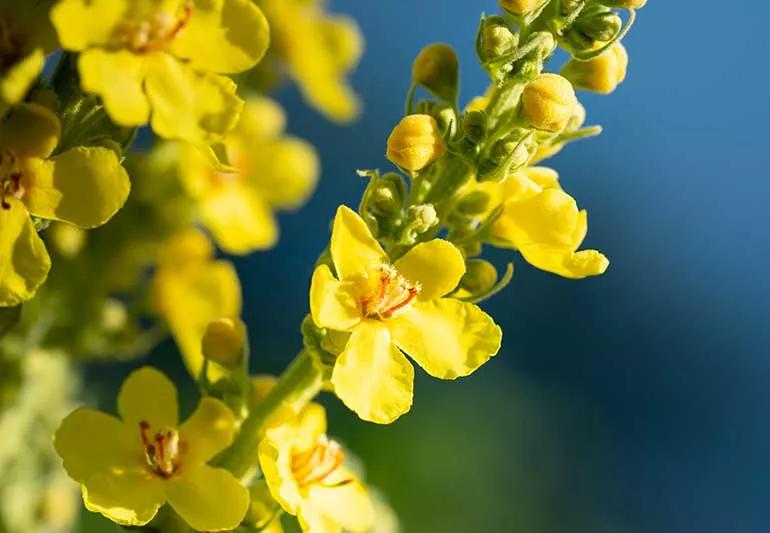For centuries, people have been drinking mullein tea for respiratory conditions

Image content: This image is available to view online.
View image online (https://assets.clevelandclinic.org/transform/ad68de92-d78f-4a1e-8f38-86eba8079546/Mullein-1372009208-770x533-1_jpg)
The Mullein flower.
Everyone has their favorite home remedies to help cure the common cold, as well as other respiratory illnesses: zinc for sore throats, vitamin C to boost immunity and chicken soup for everything.
Advertisement
Cleveland Clinic is a non-profit academic medical center. Advertising on our site helps support our mission. We do not endorse non-Cleveland Clinic products or services. Policy
Now you can add mullein to the list. This herb has been used for hundreds of years to ease respiratory ailments.
But does it really work? Functional medicine specialist Sobia Khan, MD, shares the benefits of mullein and the challenges of finding a quality product.
Verbascum thapsus, more commonly known as mullein, is a member of the snapdragon family. It’s considered a weed by some and a godsend by others.
Mullein grows in the United States but originated in Europe, Asia and North Africa, and Dr. Khan says different parts of the plant have different beneficial properties. Native Americans and colonists used it for various medicinal purposes, from helping with coughs and breathing to healing wounds.
They used to:
According to Dr. Khan, mullein still has practical uses today. It’s helpful for any lung condition that can lead to inflammation or infection. Before antibiotics, it was a go-to herbal remedy for:
These days, it’s more commonly used for less serious conditions, like:
In health stores, you can find mullein extracts, capsules, oils and teas. For respiratory issues, take mullein by mouth. People often drink mullein tea — sipping a cup of tea of any kind is soothing, and mullein may add health benefits. You can also take a mullein capsule, extract or oil. Mullein benefits your respiratory tract — especially when fighting illness — in several ways:
Advertisement
Mullein is an expectorant, a substance that thins mucus (phlegm) and makes it easier to cough up. Expectorants help break up mucus to get it out of your system.
“It’s always good to get mucus out of your airways,” says Dr. Khan. “If mucus remains in the lungs, it can form thick plugs that block airflow — and in severe cases, it can lead to lung collapse.”
When you have lung and throat issues, using mullein may relieve some of your discomfort. Its flowers and leaves contain mucilage, which coats mucous membranes (the moist linings inside of your respiratory tract) with a film, reducing inflammation.
Because of its anti-inflammatory effects, salves and oils that contain mullein can also help relieve pain and irritation in skin wounds.
Mullein contains antioxidants, including vitamin C and flavonoids (substances found in fruits and vegetables). Antioxidants protect cells from free radicals, unstable molecules that damage your cells.
Research shows that mullein stem extract combined with alcohol is 85% effective at protecting cells from damage. As mullein has antioxidant properties, it boosts your body’s natural defenses.
Mullein has antiseptic qualities, meaning it prevents the growth of disease-causing germs. One study found that it was effective at fighting pneumonia, staph and E. coli bacteria.
Other research indicates that mullein has antiviral properties, too, and may even slow the influenza virus. Taking mullein when you have a cold or flu may help you beat the infection faster.
You can use mullein tea or other forms of the herb to improve lung health and reduce symptoms of respiratory illness. It has a long history of use and little to no side effects. But the challenge is finding a source that produces a pure, effective product.
“In the U.S., it’s not manufactured in a standardized way like it is in European countries such as Germany,” Dr. Khan says. “That makes it difficult to find effective formulas here.”
If you apply mullein directly to your mucous membranes or on your skin at a high potency, you may have a skin reaction. “If it’s diluted, though, it doesn’t typically cause any side effects,” Dr. Khan states. “To date, there are no reports of negative reactions or toxic side effects of mullein.”
The biggest risk is that herbal supplements don’t undergo the same rigorous testing as medications do. So, it’s important to make sure you’re using a pure, quality product.
“Look for reputable brands that indicate they’ve been tested by a third party, so that you can trust what’s inside the bottle,” Dr. Khan advises, “and stay within the product’s dosage recommendations. Most importantly, before taking any supplements, always discuss them with your doctor.”
Advertisement

Sign up for our Health Essentials emails for expert guidance on nutrition, fitness, sleep, skin care and more.
Learn more about our editorial process.
Advertisement
Until there’s more research on it, this plant’s greatest claim to fame is its deliciousness
This adaptogenic herb can help your body respond to stress — but there’s not enough evidence to prove other claims about its benefits
This herbal medicine is said to reduce stress, ease pain and promote overall well-being, but more research is needed
Far more research is needed to support the many touted health claims
Research suggests the effect of the supplement, particularly for prostate health, may not deliver believed benefits
Two types of ginseng work in different ways to help improve energy, immunity and heart health
Besides questionable effectiveness, herbal supplements aren’t safe for everyone
Natural doesn’t mean they’re safe or effective
Although it could be used as a moisturizer, this new trend is not recommended
Communicating clear limits helps protect your time, energy and emotional well-being
High cholesterol can be genetic, but testing and treatment can lower your heart disease risk